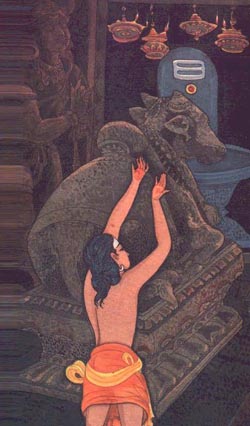 Nandanar was born in the Dalit slum village of Athanur of Tamil Nadu. He is known as the first hero in the Dalit resistance struggle. Nandanar lived in a time when Dalit voices were never heard in social life. It was an era in which Dalits gained only partial freedom by converting to Buddhism or Jainism. However for Dalits trapped in the grip of the Puranic, Hindu religion, not only were they never to be heard, they were considered too vile to ever be seen by the rest of society. Many Dalits have criticized Nandanar because spiritually he never attained realization to go beyond the worship of stone idols. Socially also he is criticized for his meek begging from arrogant brahmins to be allowed to worship the idol of Shiva in the temple city of Chidambaram.
Nandanar was born in the Dalit slum village of Athanur of Tamil Nadu. He is known as the first hero in the Dalit resistance struggle. Nandanar lived in a time when Dalit voices were never heard in social life. It was an era in which Dalits gained only partial freedom by converting to Buddhism or Jainism. However for Dalits trapped in the grip of the Puranic, Hindu religion, not only were they never to be heard, they were considered too vile to ever be seen by the rest of society. Many Dalits have criticized Nandanar because spiritually he never attained realization to go beyond the worship of stone idols. Socially also he is criticized for his meek begging from arrogant brahmins to be allowed to worship the idol of Shiva in the temple city of Chidambaram.
Such critics fail to realize that for the first time in history a Dalit tried to enter a Brahmin temple. For a Dalit, it was a crime to even step foot in the urban complex of Chidambaram. This was an act of unbounded courage, since for most Dalits it meant instant murder by the upper castes. Second, all Dalits are forever indebted to Nandanar, because he won for them their very first freedom – the freedom to sing. Even if he only sang of his pain as a Dalit and his longing for Shiva, still for the first time a Dalit voice was heard in India. Before Nandanar, Dalit voices were completely silenced in social and cultural life. Nandanar, by the overwhelming power of his devotion, by the sublime sweetness of his Tamil, compelled Indian society and Indian literature to accept the entrance of a great Dalit devotee. It was a historic first for Dalits.
While it is true that Nandanar did not transcend the superstitious stone idol worship of his times, his bhakti transcends the bhakti of any Dalit of the 20th century. Moreover Nandanar was the first Dalit martyr. The Brahmins of Chidambaram, afraid of the power of his devotional songs in the society, set him on fire and burned him to death. Yet even in death Nandanar was victorious.
The people of Tamil Nadu never forgot the devotional sublimity of his songs. Even Brahmin writers were forced to acknowledge the devotional greatness and sanctity of Nandanar. This in itself was a revolution in the Dark Age of the Puranic regime.
Next: Basava

Nandanaar story is great.From what I can read from the story Nandanar was migrating from the religion of Nandanars to Saivism.Both the village religion is still prevalent in Tamilnadu and all India.With modernisation,and dominance of other cults,Saivism,vaishism,Brahminism and other religions the village religions were seen as lower.Though Nandanar is a good study of Bhathi movement it is also promoting another cult over another.in this case Saivism over Village cult,Karupar,or Maariamman etc.
western researches,interpretations of Indian culture,religions should be cautiously read ,as one of their conscious or unconscious motives is to create a divisions in India.So they can preach their Abrahmanic religions.Subtle divide and conquer.South Asians or the sub-continent of Indians Pakistanis,Bangladeshis lived peacefully in India before the Islamic conquests and British colonialists.
I am in the process of publishing a textbook on the history of the New India where 2 of the 8 chapters of the book are about Dalits. It will be published by Routledge in England and will come out in July of this year.
Very good news indeed, and please send us a copy of your forthcoming book if possible for our review.
Very good